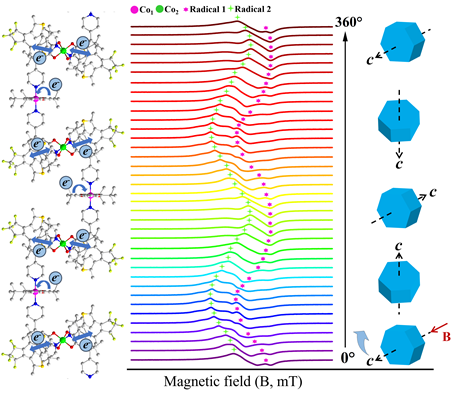
论文题目:Dual-radical-based molecular anisotropy and synergy effect of semi-conductivity and valence tautomerization in a photoswitchable coordination polymer
论文作者:Jing-Wei Dai#, Yu-Qin Li#, Zhao-Yang Li*, Hai-Tao Zhang, Carmen Herrmann, Shohei Kumagai, Marko Damjanović, Markus Enders, Hiroyuki Nojiri, Masakazu Morimoto, Norihisa Hoshino, Tomoyuki Akutagawa, Masahiro Yamashita*
发表期刊:National Science Review, nwad047

Abstract
Organic radicals are widely used as linkers or ligands to synthesize molecular magnetic materials. However, studies regarding the molecular anisotropies of radical-based magnetic materials and their multifunctionalities are rare. Herein, a photoisomerizable diarylethene ligand was used to form {[CoIII(3,5-DTSQ·–)(3,5-DTCat2–)]2(6F-DAE-py2)}·3CH3CN·H2O (o-1·3CH3CN·H2O, 6F-DAE-py2 = 1,2-bis(2-methyl-5-(4-pyridyl)-3-thienyl)perfluorocyclopentene), a valence tautomeric (VT) coordination polymer. We directly observed dual radicals for a single crystal using high-field/-frequency (∼13.3 T and ∼360 GHz) electron paramagnetic resonance (EPR) spectroscopy along the c axis, which was further confirmed by angle-dependent Q-band EPR spectroscopy. Moreover, a conductive anomaly close to the VT transition temperature was observed only when probes were attached at the ab plane of the single crystal, indicative of synergy between valence tautomerism and conductivity. Structural anisotropy studies and density functional theory (DFT) calculations revealed that this synergy is due to electron transfer associated with valence tautomerism. This study presents the first example of dual-radical-based molecular anisotropy and charge-transfer-induced conductive anisotropy in a photoswitchable coordination polymer.
